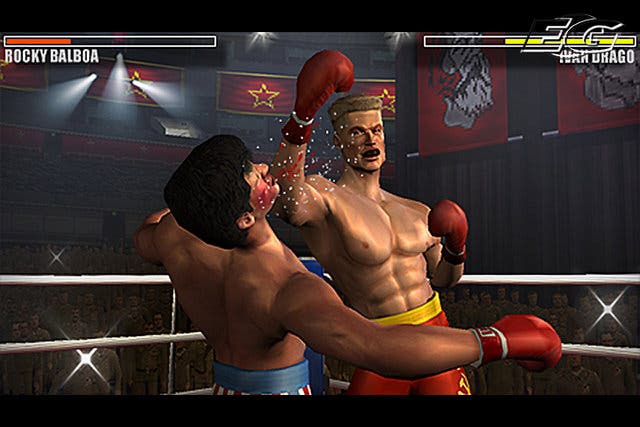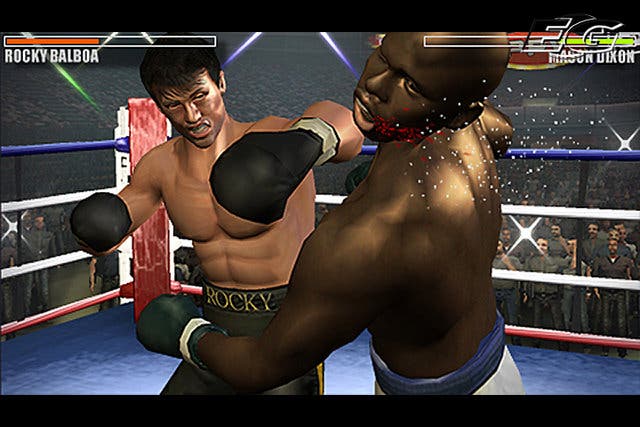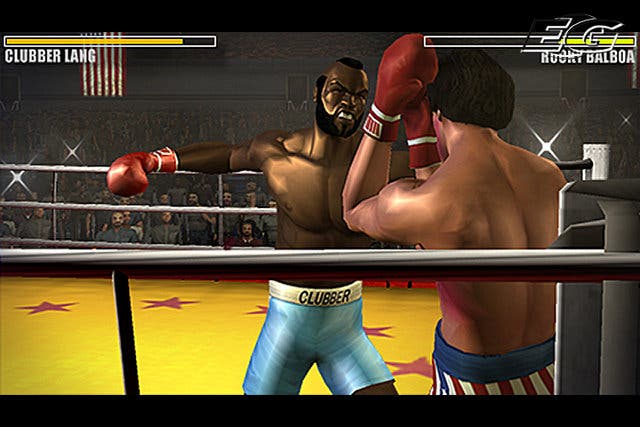Rocky Balboa
A thin line between glove and hate.
After two previous console outings, both of which relied on nothing more than the public's residual affection for slurring underdogs, Rocky finally has a new film for his games to tie-in with. So what do we get? A PSP-only release with minimal connection to the Rocky Balboa movie. Go figure.
2004's Rocky Legends donates much of its DNA to this handheld edition, in particular the focus on historical matches lifted from all the movies. Mason Dixon, the cocky bruiser that the elderly Rocky is currently facing in cinemas, gets a perfunctory inclusion but otherwise it's boxing business as usual.
Seconds out...
Upon first firing up the UMD, it's advisable to head straight for Mickey's Corner (complete with a leering digitised image of Burgess Meredith) for some training. Make no mistake; this is a complicated and often confusing game. There are over twenty offensive moves assigned to the PSP's quartet of buttons - and that's not including movement or blocking. While the control mapping is fairly logical, with the triangle and circle operating the left arm, the square and X buttons the right, it's still a lot of info to digest. When facing an angry Clubber Lang, you'll need a very cool head and clear memory to remember the difference between Killer Hook Left and Uppercut Body Left.

Once you think you've at least grasped the basics, it's time to step into the ring for real. As is now traditional, Exhibition mode lets you choose your fighters and arena, and have at it for as many rounds as you'd like. Fast Lane offers up 90 time-limited challenges, from one minute blasts up to ten minute slogs, where the requirements of victory are dictated for you. Win by a knockout. Stay on your feet for the whole bout. That sort of thing. An obvious concession to spur-of-the-moment handheld play, they're inconsequential but quite good fun.
And then there's the Historical mode, which is the closest this game comes to a career mode. Playing through each of Rocky's bouts, from the first movie all the way up to Rocky Balboa, you have to defeat each opponent before the next is unlocked. It's here that the movie license is put to fine use, with slickly edited montages from the relevant movie to set the scene, and a solid understanding of how to build excitement. The commentators add to the mood, with some repetition, but a generally believable sense that they're reacting to what's actually happening in the ring rather than blurting generic phrases.
In the mood
Once you're in the ring, it's pretty much sink or swim. If you've not got your head around the sprawling controls then you'll be lucky to get past Apollo Creed, only the second fight of the game. This game is pretty brutal, even on medium difficulty, and has no time for button-mashers or players who stagger out of their corner windmilling their arms like an idiot. If you're in control, and thinking like a fighter, then the experience is a lot more fun. The bouts follow a realistic natural rhythm, and there's plenty of room to think your way around the ring. While it can't compete with Fight Night, it's certainly a more technique-driven title than the Rocky reputation suggests. When you hit your flow, landing lefts and rights with deliberation and accuracy, it's a thoroughly exhilarating experience - made all the more satisfying for the series' enjoyably over-the-top concessions to Hollywood sizzle.

See, each fighter has their own Power Mood which can be triggered during the match. While in this heightened mental state slow motion kicks in, and your punches land with earthquake force. If you're on a roll, and keep landing punches, then the Mood grabs you automatically. If, however, you're on the receiving end of an almighty pummelling then you can trigger it manually, by landing a specific punch at the right time. Power Moods can also be broken with the right counter-attacks. It's a very movie-like conceit, allowing for the sort of dramatic last-minute turnarounds that have typified the film series, and when you pull them off there's a real sense of vindication.
During these moments, when you're sending your opponent reeling with bone-crunching volleys of shots to the head and body, the fanfare fills your mind, you feel the elation of hard-won victory and Rocky Balboa becomes a fantastic boxing game and a worthy spin-off from the whole saga.
But...
Yes, there's a but
While the game is superbly entertaining on the attack, the gameplay balanced is deeply flawed, making it virtually impossible to play a successful defensive game. The finger-mangling controls must take some of the blame. The analogue nubbin is used for movement around the ring, as a modifier for attacks and as the primary control for your guard moves. Something has to give, and it's the ability to block with any kind of consistency or accuracy.
Given the game's non-existent learning curve, with your first historical opponents proving to be serious competition right from the start, it's inevitable that even the best winning streak will eventually be turned around. Once Rocky is on the receiving end of a few Power Mood flurries, the enjoyment factor is completely reversed. The Italian Stallion winds up flat on his back, and it's here that the game collapses almost completely.

Regaining your balance after a knockdown requires you to use the analogue stick (again!) to centre Rocky's vision, simulating his unsteady attempts to stand back up. It's a fantastic idea, in theory, since it makes a lot more sense than just hammering a button. However, after losing ten bouts in a row because you have no idea how you're supposed to keep the great lummox balanced, the reality proves to be a real kick in the shorts.
The training mode is no help, nor is the manual. All they say is to keep him balanced, but are annoyingly vague as to how best to achieve this seemingly simple task. There's a little indicator which lurches from side to side, reacting sluggishly to your stick movements and then sending him the other way with the momentum, but it's ultimately the sort of teethgrinding reaction test that requires tedious practice and no small amount of luck before you even stand a chance of success. Even then, it's a hit or miss affair. Adding insult to injury, your opponents are almost always capable of getting back up again. Even when their energy has been reduced to zero, they'll stagger back to their feet, their energy will top itself up and you have to clobber them back down again. And all the while you're hoping against hope that they won't knock you down even once, because the odds are you'll reel about like a tipsy badger before collapsing on your face for the ten-count.
What you end up with is a slick and stylish boxing game that plays like a champ when you're winning, but is worryingly featherweight when it comes to defensive options. The fact that you can completely dominate your opponent, knock them down multiple times and yet still lose simply because you can't get the hang of what amounts to a stupid mini-game is almost enough to sour the whole experience. Those with limited patience should steer well clear.

